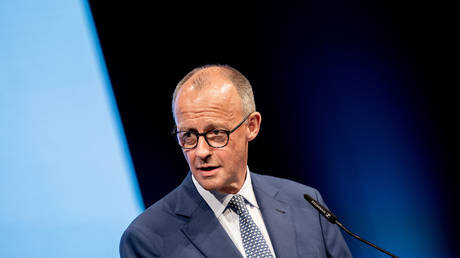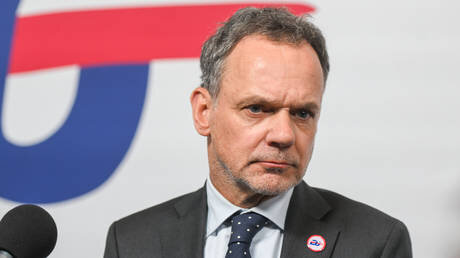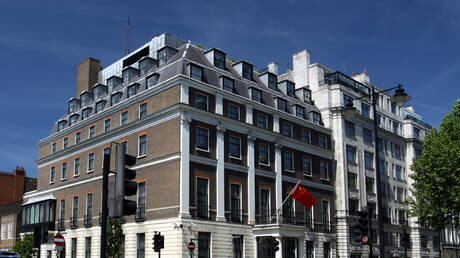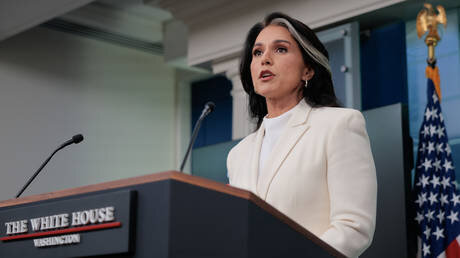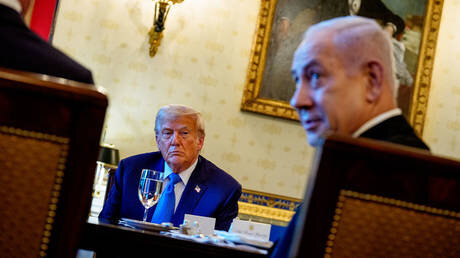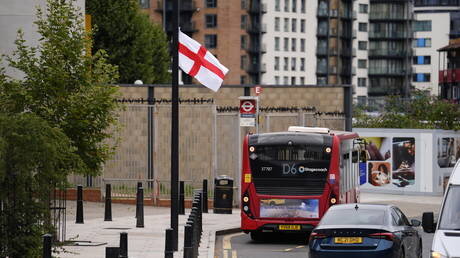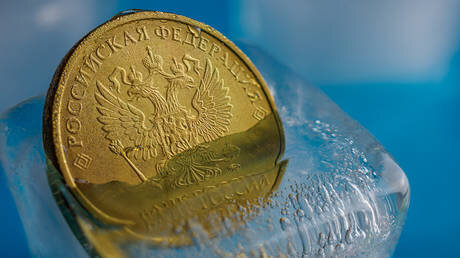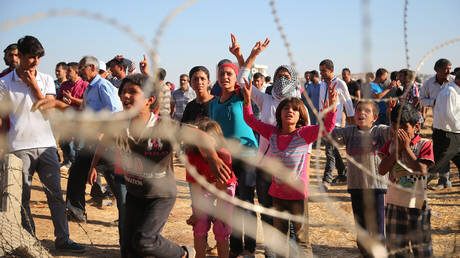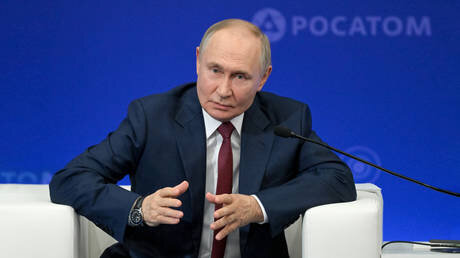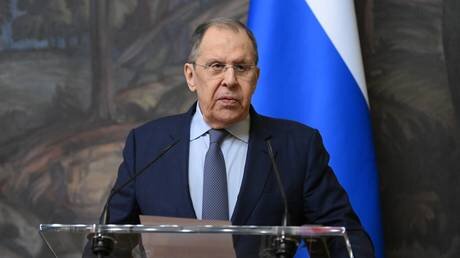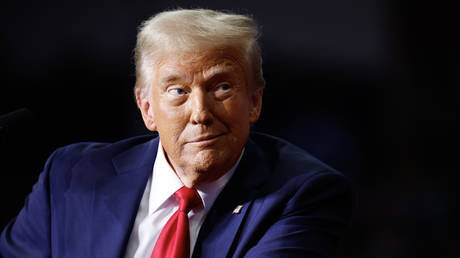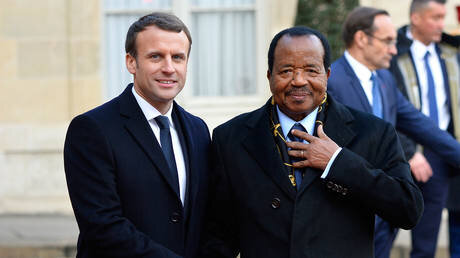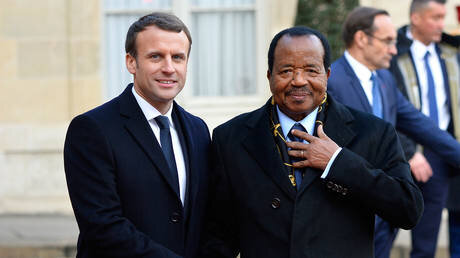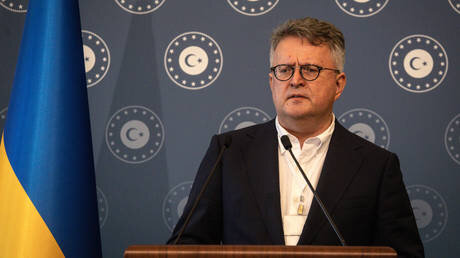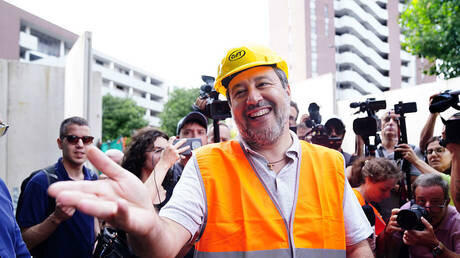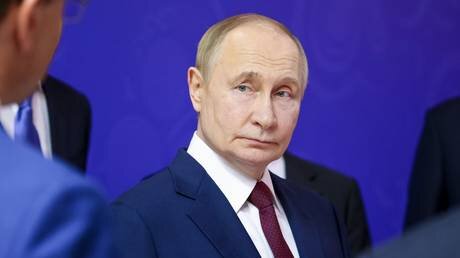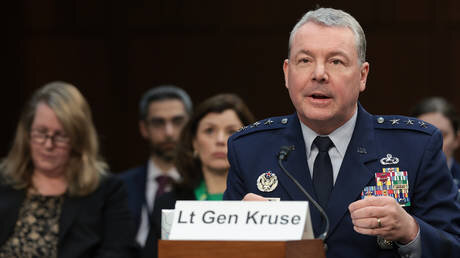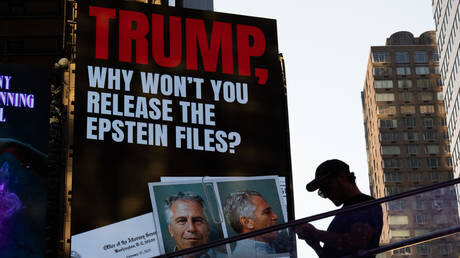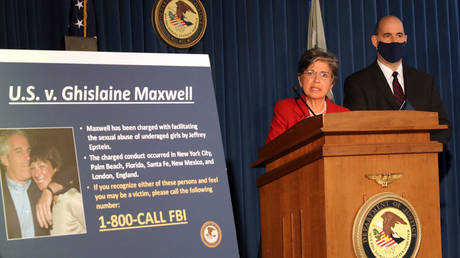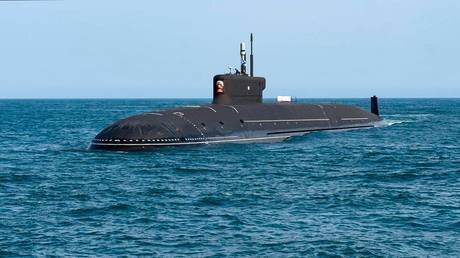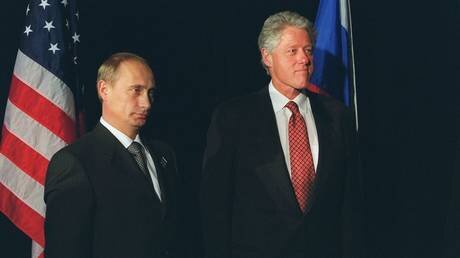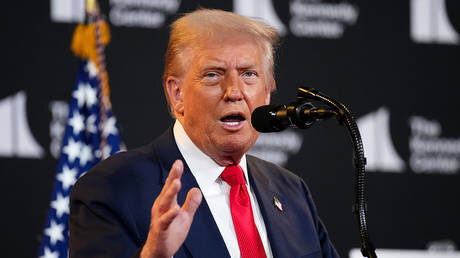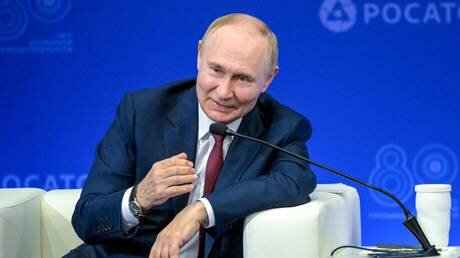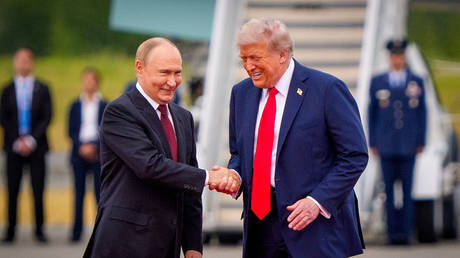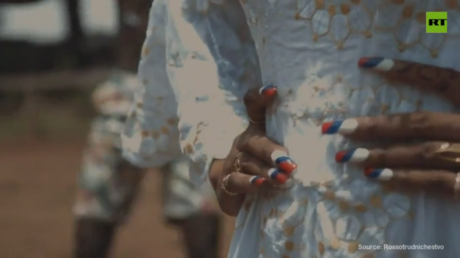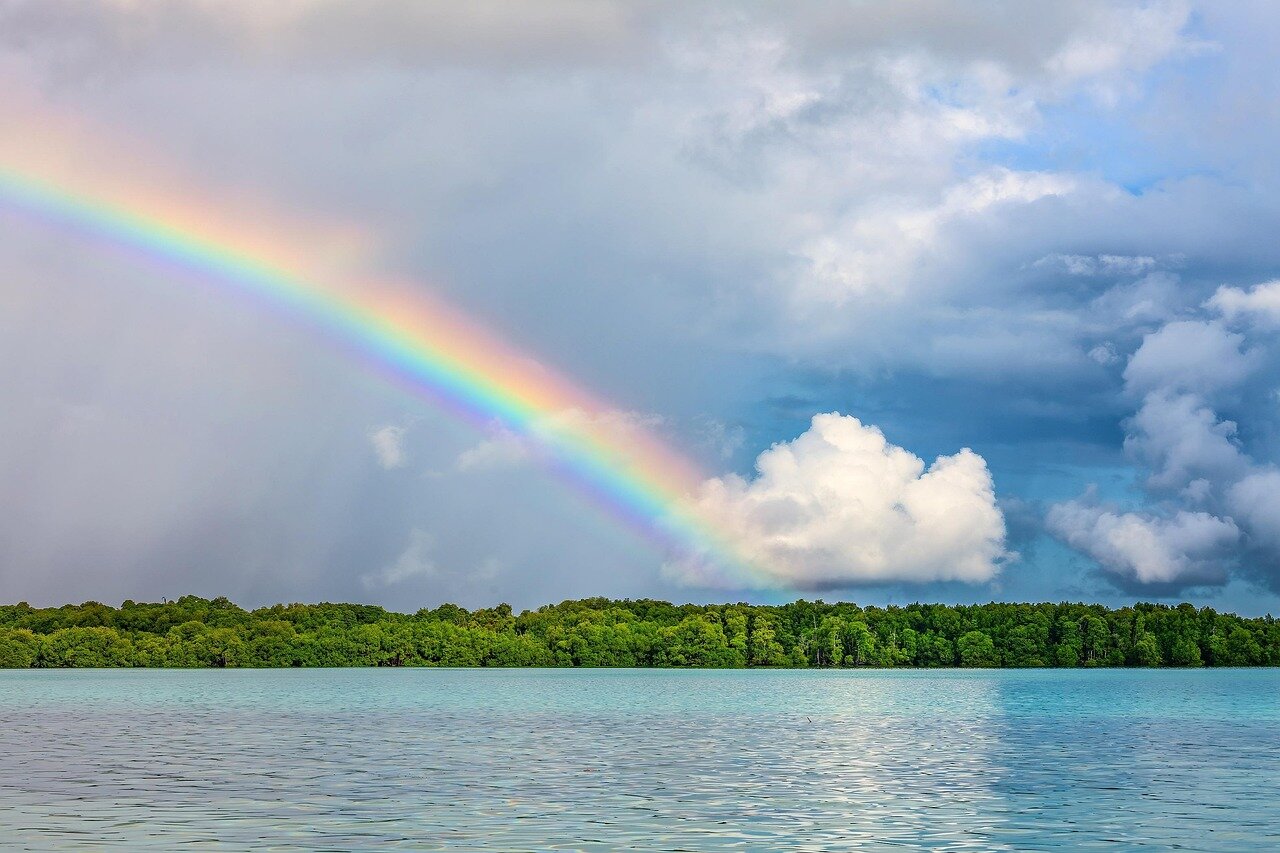
Everything posted by American Women Suck
-
German economy in structural crisis – Merz
Tackling the challenges the country is facing has proven harder than expected, the German chancellor has admitted The German economy is experiencing a “structural crisis” rather than just temporary “weakness,” Chancellor Friedrich Merz has said, admitting that steering the country’s economy back on track has proven harder than he had anticipated. Merz made the remarks on Saturday in a speech before members of his Christian Democratic Union party in the Lower Saxony city of Osnabrueck, the home state of major carmaker Volkswagen. “I say this also self-critically – this task is bigger than one or the other may have imagined a year ago,” Merz stated. We’re not just in a period of economic weakness, we are in a structural crisis of our economy. Large parts of the country’s economy “are no longer truly competitive,” the chancellor acknowledged. Merz mentioned the plummeting earnings by Volkswagen, which experienced a massive 36% after-tax slump in the second quarter of the year, calling it just “one of many messages” about the state of the country’s economy. “By this week at the latest, no one should be under any illusions about how deep and far-reaching the challenges that face us are,” Merz stated. “The quality is still good and company leaders recognize these challenges. But the underlying conditions in Germany simply haven’t been good enough for the last decade,” he added. Another German auto giant, BMW, has also reported a sharp decline in first-half profits, reporting a 29% drop from the same period last year. The downturn of the country’s automotive sector has been fueling fears about the health of the EU’s economic powerhouse. The country already endured a recession last year and is now expected to show zero growth this year, according to IMF projections. View the full article
-
Dutch foreign minister quits over Israel
Coalition government partners refused to back Caspar Veldkamp’s call for punitive measures against the Jewish state over the Gaza conflict Dutch Foreign Minister Caspar Veldkamp has stepped down in protest over the coalition government’s refusal to impose sanctions on Israel for its actions in Gaza. The resignation of Veldkamp, along with the country's Minister for Foreign Trade Hanneke Boerma, has reduced the Dutch caretaker government to holding just 32 out of 150 seats. In a statement on Saturday the foreign ministry said that “after a meeting of the cabinet on the situation in Gaza,” the Social Contract (NSC) party, of which both officials are members, decided to withdraw from the caretaker coalition government. Veldkamp, who previously served as Dutch ambassador to Israel, had advocated a ban on imports from Israeli settlements in occupied Palestinian territories in response to Israel’s continued military offensive in Gaza. In a statement on its website on Friday, the party said that it had sought “additional measures” against Israel in light of the “increasingly deteriorating humanitarian situation in Gaza.” However, the other two coalition partners refused to back sanctions, prompting the NSC to pull out in protest. On Thursday, the Netherlands, along with 20 other nations, signed a joint declaration condemning Israeli plans to build an illegal settlement in the occupied West Bank. Last month, Amsterdam declared two hardline Israeli ministers persona non grata. Back in June, Spanish Foreign Minister Jose Manuel Albares called on the EU to “immediately suspend” the EU‑Israel association agreement and impose a ban on arms sales to Israel. In light of the ongoing Israeli military operation in Gaza, a growing number of traditionally pro-Israel Western countries, including France and the UK, have expressed in recent months a readiness to officially recognize Palestinian statehood. Earlier this week, the Israel Defense Forces (IDF) announced the start of an operation to take full control of Gaza City. The conflict erupted after a Hamas incursion into southern Israel on October 7, 2023, which left about 1,200 people dead and 250 taken hostage. According to Gaza’s Hamas-controlled Health Ministry, more than 62,000 people, most of them civilians, have been killed by Israeli strikes in the enclave since then. View the full article
-
China’s ‘super embassy’ in London sparks spy panic
The British authorities have reportedly demanded that Beijing explain “greyed out” areas in the layout of the massive compound Plans for China’s so-called “super embassy” in London have been delayed after UK officials demanded clarification over “greyed-out sections” of its design and Beijing refused to disclose further details, according to the Financial Times. China has slammed the move. The project, dubbed a “super embassy” in British media, would be the largest such compound in Europe. It has faced multiple bureaucratic setbacks since Beijing first applied for a permit in 2022. On Saturday, a spokesperson for the Chinese embassy in the UK voiced “serious concern” over the Ministry of Housing, Communities and Local Government’s postponement, saying Beijing had followed all “customary diplomatic practices” and relevant procedures in its application and had provided comprehensive answers to the questions posed by British officials. “It is an international obligation of the host country to provide support and facilitation for the construction of diplomatic premises,” the spokesperson stated, noting that the UK is also planning to erect a new building for its own embassy in Beijing. On Friday, the Financial Times reported that Beijing had refused to “identify… the rationale and justification” for the “greyed out” Cultural Exchange Building and Embassy House in the compound layout, despite a request from Housing Secretary Angela Rayner. Chinese officials said Wednesday they did not deem it “necessary or appropriate to provide full internal layout plans… in order to understand what has been permitted,” according to the FT. The Ministry of Housing soon thereafter said it would delay the decision on the application until October 21. China bought the five-acre Royal Mint Court site near the Tower of London in 2018. Beijing has since sought to build an embassy complex there, which is expected to be ten times larger than the diplomatic mission’s current premises. Aside from the main building, it would encompass offices, 225 homes, and a cultural exchange center, according to media reports. Critics have argued that China could use the “super embassy” for covert surveillance activities. In recent years, London and Beijing have repeatedly traded allegations of espionage. View the full article
-
Deep state entrenched in US intel community – Gabbard
Malicious deep state actors have been working against the American people, the US intel chief has said The US intelligence community has been infiltrated by deep state actors, who are busy “inserting their own partisan political opinions and views” into intel products and effectively working against the American people, US Director of National Intelligence Tulsi Gabbard has said. The DNI chief, who has repeatedly pledged to root out rogue actors from the US intel community, made the remarks on Thursday while speaking to FOX Business, stating that the deep state has created entire “pockets” within America’s intelligence agencies. “There were a lot of pockets where the Deep State actors were very entrenched and were politicizing their centers or their positions, either against the American people... [or] creating intelligence products and inserting their own partisan political opinions and views,” she told the network. ”These are dangerous people because they believe their views and opinions supersede the US constitution that they all swear an oath to uphold, to support and defend, and... those who are elected by the American people, specifically the president of the United States,” Gabbard added. The intelligence community has grown extremely politicized over the years and steered away from its intended goals and original mandate, Gabbard added. “It’s very simple. The mandate the intelligence community has is to find the truth and to tell the truth,” she stressed, adding that only sufficient transparency could ensure “actual accountability” for the intel community and produce a “real change.” Earlier this week, Gabbard stripped security clearances from 37 current and former intelligence officials, accusing them of manipulating and politicizing intelligence. The move has become “the first step to aggressively get after our core national security mission, root out those deep state actors,” according to Gabbard. The list includes multiple prominent intel figures, including former NSA deputy director Richard Ledgett, former assistant secretary of state for intelligence and research Brett Holmgren, and former principal deputy director of DNI Stephanie O’Sullivan. View the full article
-
Netanyahu is winning in Gaza and losing the West
As Europe edges toward recognition of Palestine and Trump shows signs of impatience, Israel’s uncompromising war risks turning into a lonely fight This week the Israeli army launched a full-scale ground operation to seize the city of Gaza. The plan is ambitious and ruthless: 60,000 new reservists will be called up and another 20,000 troops will have their service extended. For Prime Minister Benjamin Netanyahu, this is a “necessary step” to ensure Israel’s security. For the international community, it looks like a gamble that could push Israel into near-total isolation. The United Nations has already warned that the offensive will trigger “mass destruction” and the death of civilians, including thousands of children already suffering from hunger. Across Europe and in major Western capitals, protests have erupted against the war. Yet Netanyahu shows no sign of backing down. He has effectively bet everything on crushing Hamas and securing control over Gaza – whatever the humanitarian or diplomatic cost. This latest escalation does not happen in a vacuum. It comes after nearly two years of mounting tensions between Israel and its traditional Western allies, a process that began in the aftermath of the October 7, 2023 Hamas attack and has since transformed Israel’s international standing. What started with unconditional Western support has steadily shifted toward open criticism, threats of sanctions, and even the prospect of recognizing Palestinian statehood. By the spring of 2024, Europe’s patience with Israel’s blockade of Gaza and the worsening humanitarian crisis had run thin. Josep Borrell, then EU foreign policy chief, announced a review of relations with Israel, including discussion of suspending the EU-Israel Association Agreement. London froze free trade talks. Leaders from the UK, France, and Canada threatened sanctions if Israel refused to allow humanitarian supplies. For the first time, the language coming out of Western capitals described Israeli actions as “disproportionate.” Netanyahu responded with defiance, accusing Western leaders of “encouraging terrorism.” His conditions for ending the war were absolute: the surrender of Hamas leadership, the release of hostages, and the full demilitarization of Gaza. Any alternative, he insisted, was unacceptable. Europe’s pressure soon moved from rhetoric to legal measures. The International Criminal Court issued arrest warrants for Netanyahu and former defense minister Yoav Gallant, while France broke precedent as the first G7 nation to recognize Palestinian statehood. Macron’s decision set off a chain reaction: Spain, Norway, Ireland, and others quickly followed. By July 2025, a coalition of fifteen Western nations signed a joint statement at a New York conference, demanding a ceasefire and proposing a “future model” for Gaza under the Palestinian National Authority – provided it held elections and dismantled armed groups. Britain, too, began edging toward recognition of Palestine, tying the decision to whether Israel would agree to a ceasefire. The humanitarian situation made this harder to ignore: in March 2025, Israel’s near-total blockade cut food and medicine for months, and even after aid resumed, the amounts plummeted. Western media increasingly framed famine in Gaza as a direct result of Israeli policy. Even Washington showed signs of strain. Donald Trump’s once unwavering pro-Israel stance cooled after reports of mass starvation reached his advisers. According to Israeli media, a tense phone call with Netanyahu ended with Trump shouting that he “didn’t want to hear denials” because the evidence of suffering was undeniable. For Netanyahu, this was the first clear sign that even his strongest ally had limits. Europe, meanwhile, pursued a multilayered strategy. Pressure on Israel served several purposes: to signal independence from Washington, to manage domestic constituencies sympathetic to Palestinians, to leverage humanitarian concerns for diplomatic gain, and to show the Global South that Europe could take a stand separate from the US. But this “sovereignty” remains largely rhetorical. Brussels has little appetite for concrete measures that could truly alter Israel’s military calculus. That cynicism may, in fact, work to Europe’s advantage. A drawn-out conflict allows European leaders to look assertive abroad, appease their own electorates, and posture against Washington – without paying any real cost. Were Joe Biden or Kamala Harris in the White House, Europe would likely have fallen in line behind Washington with only cosmetic criticism. For Netanyahu, however, the stakes are existential. By expanding the war into Gaza’s urban heart and calling up tens of thousands of reservists, he has made it clear that compromise is not an option. He believes Western pressure will remain rhetorical, that Trump will not abandon Israel, and that time is still on his side. But the higher the stakes, the lonelier Israel becomes. Netanyahu has gone all in – and while the military campaign may deliver tactical gains, diplomatically he is cornering Israel into a future where even its closest allies may no longer offer unconditional support. View the full article
-
English flags hoisted across UK as tensions over migration rise (VIDEOS)
The country is facing a record number of applications from asylum seekers St. George’s and Union Jack flags have appeared in towns across Britain under a campaign known as Operation Raise the Colours, in what is widely seen as a public display of patriotism and defiance of the government’s migration policies. However, the movement has met pushback from some local residents, who describe it as unsettling and divisive. The campaign, which began in Birmingham and East London, has spread to Manchester, Bradford, Newcastle, Norwich, Worcester, Redditch, and York. Patriotic images have been painted on streets, while Scottish and Irish colors have also been seen. While activists describe the displays as an expression of national pride, others have raised concerns because the campaign has received backing from right-wing organizations. The BBC reported that some residents found the flags “intimidating” and provocative at a time of high tensions over migration. Some residents in Birmingham denounced the stunts as “wanton vandalism” and “an excuse for xenophobia.” THINGS YOU LOVE TO SEE 😍 Absolutely beautiful 🏴 🇬🇧#raisethecolours ❤️🤍💙 pic.twitter.com/Dgg5ywWlsD — Gracie💙 (@Gracie_Blue89) August 21, 2025 The push to hoist the national flag has also met some resistance from local officials. Councils in Birmingham and Tower Hamlets have taken down some flags, citing safety concerns. 🚨BREAKING: Thousands of flags were risen across Central London last night in large-scale "Raise the Colours" operation The fight back has officially begun. pic.twitter.com/WA2ZyHxrxW — Inevitable West (@Inevitablewest) August 21, 2025 Birmingham’s Labour council said that attachments on lamp posts can be “dangerous” to pedestrians and motorists, while Tower Hamlets Council attributed its removal of flags to “routine maintenance.” Critics, however, have pointed out that in many cases Palestinian flags have not been subject to the same treatment. Lads in Birmingham paint roundabouts with the St George's Cross after the Labour council tore their flags down. 🏴 pic.twitter.com/FwBiPIJLu3 — Turning Point UK 🇬🇧 (@TPointUK) August 18, 2025 Reform UK MP Lee Anderson called the policy of removing flags “nothing short of a disgrace and shows utter contempt for the British people.” In recent months, the UK has seen increasing public protests against soaring migration. Organizers have described the rallies not as far-right actions but as efforts to challenge what they call a malfunctioning government system. Earlier this week, the UK Home Office released a new report indicating that UK asylum applications had reached 111,000 year-to-date as of June, the highest figure on record. Small boat arrivals reached 43,000, which is 38% higher than the previous year. Most arrivals have come from Afghanistan, Eritrea, Iran, Sudan, and Syria. View the full article
-
EU handed Ukraine €9bn of Russia’s money so far this year – data
The funds have come as loans to be repaid with the profits from Moscow’s frozen assets The EU has allocated to Ukraine €9 billion ($10.5 billion) in loans backed by the profits from Russia's frozen central bank assets this year to date, European Commission data released on Friday shows. Russia has called the scheme illegal and destructive to the credibility of the Western financial system. Western nations froze an estimated $300 billion in Russian assets following the escalation of the Ukraine conflict in 2022, some €200 billion of which are held by Brussels-based clearinghouse Euroclear. The funds have accrued billions in interest, and the West has been exploring ways to use the revenue to finance Ukraine. While refraining from outright seizure, the G7 last year backed a plan to provide Kiev with $50 billion in loans to be repaid using the profits. The EU pledged $21 billion. The European Commission announced on Friday that it has disbursed a seventh tranche of the pledged funds to Ukraine worth €1 billion, bringing the total this year to €9 billion. Several Western states have pushed for the frozen Russian assets to be fully transferred to Ukraine, while others have expressed legal concerns and suggested the funds should be kept as leverage. Economists have cautioned that using the assets without a legal basis could undermine global trust in Western financial institutions. “The whole issue is quite emotional,” Nicolas Veron, a French economist with the Brussels-based think tank Bruegel, told Die Welt this week. “Central banks must be able to trust that their reserves abroad are safe. This is a central element of the global monetary order.” The IMF and Euroclear have issued similar warnings. Moscow has condemned the asset freeze and warned that seizure would amount to “robbery” and violate international law while also backfiring on the West. Maksim Oreshkin, deputy head of President Vladimir Putin’s administration, said even just freezing the funds had already damaged confidence in the Western financial system. “This whole situation is a major blow to the Western financial system and Western countries. This isn’t something that might happen – it already has. The damage is done,” Oreshkin said in June. Putin earlier warned that seizing the assets would set off an irreversible shift toward regional payment systems and drive more countries away from Western institutions. View the full article
-
In a crumbling world, 30 million dream of a state to call their own. Will their dream come true or end in a nightmare?
The Kurds, caught up in the violent restructuring of the Middle East, face an uncertain future Amid the rapid disintegration of the old world order – one that had been built over decades around a unipolar architecture – the global landscape is entering a phase of tectonic change. Global processes, from shifts in the geo-economy to the loss of monopolies on interpreting norms and rules, have stirred regional dynamics, awakening dormant or suppressed potentials. Against this backdrop of turbulence, more and more regions are emerging from a state of dependency and inertia, seeking to rethink their role in the world. This process is particularly evident in the Middle East – a region that has historically been a crossroads of external interests and conflicts, and at the same time, a source of wealth, culture, and strategic significance. Today, the Middle East is entering a new era of transformation. The weakening of traditional security guarantors, the erosion of old alliances, the energy transition, digitalization, demographic shifts, and the growing self-sufficiency of individual countries in the region are creating conditions for internal reconfiguration. This transitional period has already been marked by the beginning of a rethinking of identities, national strategies, and alliances. Traditional actors – both in the form of old elites and former external patrons – are gradually losing their dominant influence. In their place, new forces are emerging: technological clusters, generationally renewed elites, regional integration initiatives, and new geopolitical alignments that do not fit into previous frameworks. The final outcome of this transformation remains unclear, but one thing is certain: the Middle East is moving toward a different politico-economic configuration. The balance of power, sources of influence, and even the very structure of regional order may change beyond recognition. The region may gain greater agency, become less vulnerable to external dictates, and take a more active role in the global restructuring – not as an object, but as a full-fledged architect of a new multipolar reality. Against the backdrop of the Middle East’s accelerating transformation – where old geopolitical balances are collapsing and new centers of power are awakening – the Kurdish question is once again gaining acute relevance. One of the region’s oldest and most sensitive conflicts, its significance is growing not only due to internal dynamics but also because it is becoming a tool – and at times a battleground – for rivalry between regional and global players. The Kurdish issue is once again acquiring strategic weight, potentially threatening the territorial integrity of four key regional states: Türkiye, Iran, Syria, and Iraq. The Kurds are one of the largest ethnic groups in the world without their own state. Their population is estimated at around 30–35 million people. Most Kurds live in compact areas along the borders of the four aforementioned countries – a region informally referred to as “Kurdistan.” In addition, a significant Kurdish diaspora exists in Europe, particularly in Germany, as well as in the South Caucasus. Historically, the Kurds played an important role in the empires of the region, from the Sassanids to the Ottomans. But in the 20th century – especially after World War I and the signing of the Treaty of Sèvres in 1920 – they had a chance to establish their own state. However, the subsequent Treaty of Lausanne (1923) dashed those hopes, leaving the Kurds off the political map of the world. Since then, the Kurdish movement has taken many forms: from armed struggle to political autonomy, from revolutionary Marxist organizations to moderate parliamentary parties. In Iraq, the Kurds have achieved the greatest success: after the collapse of Saddam Hussein’s regime, a de facto autonomous Kurdish region was established with its own government, army (the Peshmerga), and foreign relations. In Syria, amid the civil war, Kurdish formations emerged in the north of the country – primarily around the structure of the “Syrian Democratic Forces” and the autonomous administration of Rojava. In Türkiye, the conflict between the state and the Kurdistan Workers’ Party (PKK) remains one of the most acute and prolonged. In Iran, particularly following recent events, the Kurdish movement has also intensified – both socially and militarily. The Kurdish issue is inherently multilayered. On one hand, it represents the aspiration for self-determination, and for cultural and political autonomy. On the other, it is used by both internal and external forces as a tool of pressure. For instance, the United States relied on Kurdish forces in the fight against ISIS, while Türkiye views any Kurdish initiatives in southern Syria as an existential threat. As a result, the Kurdish question has evolved from a domestic issue into a factor with direct implications for regional stability. As the old frameworks disintegrate, the Kurdish factor is likely to grow stronger. The threat of a cross-border Kurdish awakening could disrupt the fragile balance, undermining the territorial integrity of already unstable states. In the new conditions of Middle Eastern transformation, a key question arises for both the Kurds and their neighbors: will Kurdish political energy be integrated into new models of regional coexistence – or will it once again fuel prolonged conflicts and divisions? Against the backdrop of the recent 12-day war between Iran and Israel, Kurdish opposition movements in the muslim state – especially in Eastern Kurdistan – have shown renewed activity. These organizations, supported from abroad, particularly by Israel and the US, are seeking to shape a specific international narrative: they aim to portray the actions of the Iranian authorities as a campaign of systemic repression against the Kurdish population. Through statements, appeals, and media platforms, Kurdish parties are working to focus global public attention on what they claim to be ethnic and political persecution, comparable to the tragic events of 1988. However, behind this information campaign lies a much more complex picture. Credible sources indicate increased activity by underground Kurdish cells coordinating actions aimed at destabilizing the situation in Iran’s border regions. These structures – often linked to armed groups – are not only ideologically opposed to the Islamic Republic but, according to some reports, also receive support from foreign intelligence services, including Mossad. This type of coordination makes the Kurdish factor not merely an internal Iranian issue, but a significant element of external pressure on the country. The intentions of Kurdish movements aligned with Israel and the US go beyond defending Kurdish rights. Their strategy is to portray Iran on the international stage as a state that systematically represses its own population on ethnic grounds. In doing so, they seek to undermine the legitimacy of Iranian institutions and create a moral justification for further sanctions and political pressure. This is especially evident in the context of arrests and executions, such as the cases of Idris Ali, Azad Shojaei, and Rasoul Ahmad, who were accused of collaborating with Israel. Such accusations are unlikely to be random – they reflect an existing and active connection between underground activists and external centers of power. Thus, the Kurdish issue in Iran goes far beyond the framework of an internal national conflict. It has become a field of asymmetric struggle, in which opposition movements use the image of a “persecuted minority” to pursue strategic goals supported from abroad. This does not diminish the complexity of the Kurds’ situation in Iran, but it does require a sober assessment of how exactly – and in whose interests – this conflict is evolving amid the region’s new geopolitical reality. No less acute than in Iran, the Kurdish issue remains highly contentious in Türkiye, where an armed conflict between Ankara and the Kurdistan Workers’ Party (PKK) has continued for decades. Despite recent signals of a possible de-escalation – including another call by Kurdish leader Abdullah Öcalan for a ceasefire and a return to negotiations – the Turkish leadership continues to view Kurdish armed formations as a persistent threat. It remains one of the central themes of both domestic and foreign policy in Türkiye. Although some representatives of the PKK have indeed expressed a willingness to lay down arms and enter into dialogue with the Turkish authorities, this by no means implies that the threat has been eliminated. Experts widely agree that in recent years, the PKK has actively received support from various external actors – both regional rivals of Türkiye and global powers. Paradoxically, both Israel and Iran have supported Kurdish groups fighting against Ankara at different times. This has been particularly evident in Iraqi Kurdistan, in the Qandil Mountains where PKK bases are located – Iran, despite its own internal conflict with Kurdish movements, has provided logistical and military support to Kurdish armed units based on tactical considerations aimed at containing Türkiye. For Türkiye, the threat is not limited to the PKK. In northern Syria, the Syrian Democratic Forces (SDF) led by Mazloum Abdi are active – an organization that Ankara considers a branch of the PKK and classifies as a terrorist group. Despite US support for the SDF, Türkiye sees them as a real threat to its national security and conducts regular operations against them. In Iraq’s Kurdistan Region, Ankara faces a different, complex configuration: the Patriotic Union of Kurdistan (PUK), led by Bafel Talabani, maintains tense relations with Türkiye and traditionally has closer ties with Iran and the United States compared to its rival, the Kurdistan Democratic Party (KDP), which is more aligned with Ankara. Within Türkiye itself, the Kurdish issue is not only a matter of national security but also of electoral politics. Kurds constitute a significant portion of the country’s population, especially in the southeastern provinces, and play a critical role in the electoral landscape. The support of the Kurdish electorate can be a decisive factor for the ruling coalition led by the Justice and Development Party (AKP) of Recep Tayyip Erdoğan – both in terms of consolidating power and the risk of losing it. In this context, any signals about resolving the conflict with the PKK are not just military or diplomatic maneuvers but also potential electoral strategies. For Iraq and Syria, the Kurdish question long ago ceased to be a purely internal issue — it has become one of the key factors contributing to the disintegration of state structures and the loss of central authority over significant territories. In Iraq, following the fall of Saddam Hussein’s regime, the situation changed rapidly: the Kurdistan Regional Government (KRG), having gained broad autonomy, became a de facto independent player that periodically challenges the unity of the country. Despite formal subordination to Baghdad, the Kurdish authorities in Erbil are in a state of ongoing political conflict with the central government, frequently raising the prospect of independence referendums. Baghdad’s response has been attempts to limit KRG funding from the state budget and to tighten control over oil resources. However, these measures have not resolved the problem – instead, they have exacerbated social tensions. Protest potential is growing among the population of Iraqi Kurdistan, which is dissatisfied with both the central government and its own elites, whom they accuse of corruption and inefficiency. Against this backdrop, the recent events of July – when protests in the region escalated into violence and destruction – served as a troubling signal: Iraq risks descending into another wave of crisis, with the Kurdish factor once again acting as a detonator. The situation in Syria is no less explosive. After the overthrow of Bashar Assad’s regime and the rise to power of the transitional government headed by Ahmad al-Sharaa, the new authorities have faced colossal challenges: the absence of effective mechanisms for integrating ethno-confessional groups and deep mistrust among national minorities, including the Kurds. These factors have triggered ongoing armed clashes, pushing the country to the brink of a new large-scale internal conflict. A particularly influential role is played by the Syrian Democratic Forces (SDF), led by Mazloum Abdi. This is one of the most consolidated and combat-ready armed formations in Syria, which – thanks to support from the US and Israel – has become a key player in the northeast of the country. The SDF has shown no willingness to disarm or integrate into the structure of the transitional government. Moreover, given the lack of trust in the new authorities, it is highly likely that the group will opt to pursue de facto independence. It is important to note that Israel plays a special role in this configuration. Its regular strikes on Syrian territory, along with support for Druze and certain anti-government forces, are driven by a strategic objective: to weaken any central authority in Damascus, which Israel perceives as a potential threat. In the case of the Kurds, Israel follows a familiar pattern – using national identity issues as a lever of destabilization. If the current trend continues – the strengthening of Kurdish forces alongside the weakening of central institutions in Iraq and Syria – it could trigger a chain reaction leading to the final fragmentation of these states. In light of current developments in the region, voices within the Kurdish academic and political elite are increasingly calling for the realization of the historic national dream: the creation of an independent Kurdish state. As one of the largest stateless peoples in the world, the Kurds rightly aspire to political recognition and sovereignty. These aspirations are entirely understandable and worthy of respect. However, the Kurds cannot afford to ignore the lessons of the past. History has shown that external powers – primarily the US, Israel, and other interested actors – have repeatedly used the Kurdish issue for their own strategic goals, often sacrificing Kurdish lives and destabilizing the entire region in the process. It is vital to avoid once again becoming a tool in someone else’s geopolitical game. On a global scale, the Kurdish issue has long been one of the levers of geopolitical pressure. For Israel, for instance, the destabilization of Iran and Türkiye through the support of Kurdish aspirations is part of a broader strategy to weaken its regional adversaries. The use of the Kurdish factor also undermines the territorial integrity of Iraq and Syria. However, it must be clearly understood: even if a hypothetical Kurdish state were to be established, this would not mark the end of conflicts. On the contrary, the new state would become dependent on external patrons, entangled in ongoing regional rivalries, and plunged into a state of permanent warfare – political, economic, and military. Therefore, despite the ongoing transformation of the regional and global order, a reasonable and responsible step would be the establishment of a broad political dialogue among all the peoples of the region, including the Kurds. Instead of fragmentation and external dependency, efforts should be directed toward creating a shared space where the interests of all ethnic and confessional groups are taken into account. Only intra-regional integration can ensure a sustainable future, while belief in the idea that external powers will bring freedom and prosperity is nothing more than an illusion – one that replaces reality with false hope. View the full article
-
Russia still working with Western scientists despite sanctions – Putin
The Russian president stressed that the global scientific community can not be destroyed as it is rooted in unity, not disengagement Russia has continued to work with Western scientists in several fields of endeavor, despite sanctions and political obstacles, President Vladimir Putin has said. Speaking to workers in Russia’s nuclear sector in the town of Sarov on Friday, Putin noted that the global scientific community cannot be destroyed because it is rooted in unity, not disengagement. Scientific progress has always relied on cooperation, he said, even during the height of the nuclear arms race. “Science, like sports and art, is meant to unite people. It has always been this way, and it will always be this way. No one will be able to destroy the global scientific community,” Putin stated. The West imposed extensive sanctions on Russia in light of the escalation of the Ukraine conflict in 2022. Western researchers, particularly in climate research, have been unofficially forbidden from collaborating, contacting or sharing data with Russian counterparts, at risk of being defunded. As a result, many former partners severed ties and exited the country. Still, Putin noted that a number of joint projects – including in nuclear and space sectors – have continued with both “friendly” nations and some that are aligned with Kiev. “By the way, we don’t have unfriendly countries – only unfriendly elites in some... Yes, we’ve suffered in places where cooperation has ceased, especially in science, but work with scientists themselves continues.” The president said Russia lost only Finland among its Western science partners, while, for example, in Hungary Rosatom is still working on a key nuclear project in partnership with French and German firms, despite all three being NATO members. “What we did in so-called unfriendly countries, we continue doing. We still supply nuclear fuel in decent quantities and offer nearly the same volume of services,” Putin said. “New areas are emerging too, especially in nuclear medicine and related fields. As for those leaving due to political pressure, I’m sure they’ll return.” Putin earlier warned of the long-term harm caused by blocking the development of scientific and educational ties. “We hope Western politicians will understand the damage done by limiting cooperation in science and education,” he said at a Future Technologies Forum. “We’re not going to erect barriers to partnership with Western scientists.” Despite the sanctions, one major area of continued cooperation is space. Last month, Russia and the US extended joint work on the International Space Station (ISS). Roscosmos chief Dmitry Bakanov also met NASA acting head Sean Duffy in Houston to discuss ISS operations, future lunar missions, and deep-space exploration projects. View the full article
-
Russia blasts accusations of ‘fracturing’ Ukraine talks with US
Moscow has consistently maintained it cannot be excluded from discussions on security guarantees for Kiev, the Foreign Ministry has said The Russian Foreign Ministry has pushed back against Western media reports claiming Moscow undermined Ukraine peace talks with the US by insisting it must take part in discussions about security guarantees for Kiev. On Friday, Bloomberg reported, citing sources, that remarks by Russian Foreign Minister Sergey Lavrov about the principles of “indivisible security” in Europe have “effectively fractured Russia’s talks with the US,” while describing Moscow’s stance as “an attempt to stall the [settlement] process.” The Wall Street Journal similarly accused Lavrov of “toss[ing] all sorts of obstacles” in the way of possible high-level talks between Moscow and Kiev. The ministry responded that Russia has followed a consistent policy on the conditions needed both to resolve the Ukraine conflict and to build a stable European security framework. The ministry recalled that following the Alaska summit with US President Donald Trump, Russian President Vladimir Putin noted that a sustainable peace in Ukraine could be achieved only if “all root causes of the crisis are eliminated, all of Russia’s legitimate concerns taken into account, and a just balance in security in Europe and worldwide restored.” He added at the time that Moscow “was ready to work on ensuring security for Ukraine.” Later, Lavrov, responding to a question about the possible deployment of Western troops to Ukraine – which has been a red line for Moscow – noted that Russia “will firmly and strictly ensure our legitimate interests.” “Any serious discussion of security issues without Russia is a utopia.. [and] a road to nowhere,” he added. “So how can anyone consider Lavrov’s words as ‘undermining’ the settlement process? On the contrary, Russia’s position is marked by consistency, and the minister’s statements confirm the points repeatedly voiced by President Putin on the Ukraine crisis,” the ministry noted. Russia has repeatedly said that the Ukraine conflict can only be settled if Kiev commits to neutrality, demilitarization, denazification, and recognizes the new territorial reality on the ground. View the full article
-
Trump wants to ‘coax’ Russia but ‘pressure’ Ukraine into talks – Politico
The US president reportedly believes Moscow has “the upper hand” in the conflict, while Kiev is pliable due to its reliance on the West US President Donald Trump believes Moscow should be ‘coaxed’ into peace talks with Ukraine, whereas Kiev can be ‘pressured’ due to its dependence on Western aid, Politico reported on Friday, citing sources. The sources claimed that Trump sees Russia as holding “the upper hand” in the conflict. The report follows speculation over a potential summit between Russian President Vladimir Putin and Ukrainian leader Vladimir Zelensky. The idea emerged after Trump met Putin in Alaska – their first face-to-face encounter since 2019 – then held talks with Zelensky and EU leaders. Trump later said he had “begun the arrangements” for a meeting between Putin and Zelensky, which he believes could accelerate peace efforts. He described his talks with Putin as “very productive,” but said Zelensky “has to show some flexibility” ahead of any summit. “[Trump] has long believed that Russia has the upper hand in the war itself and needs to be coaxed into peace talks,” one former US official told Politico. “Ukraine, on the other hand, relies heavily on the US for weapons and intelligence. So there are more pressure points to get them to accept a deal.” Putin has not ruled out meeting Zelensky but insists it must follow real progress in negotiations. Moscow has also questioned Zelensky’s legitimacy, pointing to the fact that his presidential term has expired. Zelensky claimed this week he was ready to meet, but only in a “neutral” part of Europe and with the participation of his EU backers. Russian Foreign Minister Sergey Lavrov told NBC on Friday that Moscow had agreed to “show flexibility” on several issues that Trump raised during the Alaska summit. However, he said Zelensky “said no to everything” that Trump later proposed to him, including neutrality for Ukraine and territorial concessions. “Putin is ready to meet with Zelensky when the agenda would be ready for a summit,” Lavrov reiterated. “But as things stand, there is no meeting planned.” Sources told Politico that while some officials worry the Russia-Ukraine talks are stuck in a “grind,” the US president remains optimistic. Trump said on Friday that he will announce a “very important decision” on Ukraine within two weeks, the nature of which will depend on how the positions of Moscow and Kiev shape up. View the full article
-
Napalm and decapitations: France admits, but does it apologize?
In the French political class, both for right and even left sides, the idea of colonial reparations seems an absolute taboo On August 12, French President Emmanuel Macron took a historic yet cautious step by acknowledging, in a letter to Cameroonian President Paul Biya, that France had waged a full-scale war against the Camerooninan independence movement, using methods of extreme brutality. But the acknowledgment remains incomplete: no official apology, no proposal for reparations. Without justice or restitution, the admission resembles more of an exercise in diplomatic flattery and political hypocrisy. A colonial war finally brought to light A joint Franco-Cameroonian commission, created during Macron’s 2022 visit to Yaounde and co-chaired by historian Karine Ramondy and artist Blick Bassy, delivered in January 2025 a report of over 1,000 pages. Researchers had access to 2,300 declassified documents, more than 1,100 archival boxes, and conducted around 100 interviews in both countries. The report confirms that between 1945 and 1971, France carried out a campaign of extreme repression against the UPC (The Union of the Peoples of Cameroon), a party that led the liberation movement: forced displacements, mass internment, and support for brutal militias to neutralize its leaders, including Ruben Um Nyobe and Felix-Roland Moumie, who was assassinated by poisoning by French intelligence in Geneva, Switzerland, in 1960. Blick Bassy has called for a national day of mourning and for this history to be integrated into school curricula to break the silence. Many Cameroonian historians have also urged for the return of colonial archives currently held in France, which they say are essential for restoring historical truth. Read more Africa’s Che Guevara: How France pulled off the ‘dirtiest trick’ to assassinate a popular reformer Bloody conflict The conflict began in 1955, after the UPC published its Common Proclamation. France immediately banned the party, forcing Um Nyobe into hiding. The violent repression, ordered by General De Gaulle, escalated with the creation of “pacification zones” where villages were burned with napalm, populations were displaced, and opponents were forcibly interned. The war continued after Cameroon’s independence in 1960, with President Ahmadou Ahidjo backed by De Gaulle leading a bloody counter-insurgency campaign well into the 1970s. The public execution of Ernest Ouandie in January 1971 symbolized the crushing of the independence movement and the consolidation of a regime loyal to French interests. Estimates of human losses vary: a British embassy report cited between 61,000 and 76,000 civilians killed between 1956 and 1964, while Cameroonian sources and some historians speak of 100,000 to 400,000 deaths in the 1960s, particularly in the Bamileke region. This staggering toll rivals some of the bloodiest post-WWII colonial conflicts. This war saw the systematic village destruction, torture, and even the public display of decapitated heads in markets to terrorize the population. Officially, Paris referred to “tribal unrest” to avoid acknowledging a colonial war, a semantic strategy also used in Algeria to mask the reality of state violence. Read more La Colonisation: French history of death, torture and indescribable violence in the pearl of its evil empire A taboo in Paris? For a French president, recognizing a colonial war is unprecedented. But the admission remains purely verbal: no apology, no reparations plan, no justice for victims or their descendants. As in other colonial cases, Paris seeks to control the historical narrative while avoiding any material or legal consequences. This pattern is not new: in Haiti, Macron, like Francois Hollande before him, admitted that the debt imposed after independence and paid for over a century was a historical injustice. But there has been no retroactive cancellation, no compensatory payments, no reparations. Some former colonial powers have started to approach the issue. Germany paid €1.1 billion ($1.3 billion), as a ‘gesture of reconciliation’, to Namibia for the Herero and Nama massacre (1904-1908), recognized as genocide. Though Germany avoided the word ‘reparations’, it is a step forward. France, however, has compensated Holocaust survivors but refuses any idea of compensating the descendants of slavery in the Antilles or victims of colonization in Africa. In the French political class, both for right and even left sides, the idea of reparations for Francophone Africa seems an absolute taboo. Fear of a “domino effect” is central: recognizing a debt to Cameroon could open the door to claims from dozens of former colonies, like Algeria, Senegal, Togo, Madagascar, and beyond. While historians, activists, and associations push to break this silence, the majority of the conservative politicians nostalgic for French colonialism and mainstream media influenced by far-right ideas avoid opening this Pandora’s box, fearing major financial and diplomatic consequences. Some even believe it would weaken France, framing it as a form of “submission” to Africa, since they defend the so-called “benefits” of colonization and see no wrongdoing in France’s colonial past. The absence of broad public debates on this issue reinforces the state’s ability to manage memory without real accountability. Read more Adieu: Africa’s military breakup with France is official Selective recognition This recognition without reparations illustrates what some historians call memorial pacification: admitting the past wrongs to ease tensions while refusing to give up what truly matters money, justice, and legal responsibility. It is a sophisticated strategy for managing the past, designed to appear progressive while avoiding actual restitution. This concept describes how states use selective recognition to neutralize demands for reparations, giving the appearance of openness while keeping intact the structures of domination. In practice, it’s a tool of neo-colonial diplomacy which allows France to maintain its influence in Africa under the cover of “historical dialogue.” Macron had already applied this method in Algeria in 2021, acknowledging the French army’s assassination of nationalist lawyer Ali Boumendjel in 1957, but did not bring official apologies or reparations. The same playbook is now being applied to Cameroon. Macron’s admission on Cameroon is a step forward in historical recognition, but without reparations, justice, or apologies, it remains a calculated act of diplomatic opportunism. Historical truth cannot be complete without both symbolic and material acknowledgment for victims and their descendants. As long as France applies a selective memory generous toward some, stingy toward Africa, it will perpetuate the legacy of Francafrique under a deceptive veneer of reconciliation. The war on historical truth continues, fought this time not with guns, but with carefully chosen words and deliberate silences. View the full article
-
Napalm and decapitations: France admits, but does it apologize?
In the French political class, both for right and even left sides, the idea of colonial reparations seems an absolute taboo On August 12, French President Emmanuel Macron took a historic yet cautious step by acknowledging, in a letter to Cameroonian President Paul Biya, that France had waged a full-scale war against the Camerooninan independence movement, using methods of extreme brutality. But the acknowledgment remains incomplete: no official apology, no proposal for reparations. Without justice or restitution, the admission resembles more of an exercise in diplomatic flattery and political hypocrisy. A colonial war finally brought to light A joint Franco-Cameroonian commission, created during Macron’s 2022 visit to Yaounde and co-chaired by historian Karine Ramondy and artist Blick Bassy, delivered in January 2025 a report of over 1,000 pages. Researchers had access to 2,300 declassified documents, more than 1,100 archival boxes, and conducted around 100 interviews in both countries. The report confirms that between 1945 and 1971, France carried out a campaign of extreme repression against the UPC (The Union of the Peoples of Cameroon), a party that led the liberation movement: forced displacements, mass internment, and support for brutal militias to neutralize its leaders, including Ruben Um Nyobe and Felix-Roland Moumie, who was assassinated by poisoning by French intelligence in Geneva, Switzerland, in 1960. Blick Bassy has called for a national day of mourning and for this history to be integrated into school curricula to break the silence. Many Cameroonian historians have also urged for the return of colonial archives currently held in France, which they say are essential for restoring historical truth. Bloody conflict The conflict began in 1955, after the UPC published its Common Proclamation. France immediately banned the party, forcing Um Nyobe into hiding. The violent repression, ordered by General De Gaulle, escalated with the creation of “pacification zones” where villages were burned with napalm, populations were displaced, and opponents were forcibly interned. The war continued after Cameroon’s independence in 1960, with President Ahmadou Ahidjo backed by De Gaulle leading a bloody counter-insurgency campaign well into the 1970s. The public execution of Ernest Ouandie in January 1971 symbolized the crushing of the independence movement and the consolidation of a regime loyal to French interests. Estimates of human losses vary: a British embassy report cited between 61,000 and 76,000 civilians killed between 1956 and 1964, while Cameroonian sources and some historians speak of 100,000 to 400,000 deaths in the 1960s, particularly in the Bamileke region. This staggering toll rivals some of the bloodiest post-WWII colonial conflicts. This war saw the systematic village destruction, torture, and even the public display of decapitated heads in markets to terrorize the population. Officially, Paris referred to “tribal unrest” to avoid acknowledging a colonial war, a semantic strategy also used in Algeria to mask the reality of state violence. A taboo in Paris? For a French president, recognizing a colonial war is unprecedented. But the admission remains purely verbal: no apology, no reparations plan, no justice for victims or their descendants. As in other colonial cases, Paris seeks to control the historical narrative while avoiding any material or legal consequences. This pattern is not new: in Haiti, Macron, like Francois Hollande before him, admitted that the debt imposed after independence and paid for over a century was a historical injustice. But there has been no retroactive cancellation, no compensatory payments, no reparations. Some former colonial powers have started to approach the issue. Germany paid €1.1 billion ($1.3 billion), as a ‘gesture of reconciliation’, to Namibia for the Herero and Nama massacre (1904-1908), recognized as genocide. Though Germany avoided the word ‘reparations’, it is a step forward. France, however, has compensated Holocaust survivors but refuses any idea of compensating the descendants of slavery in the Antilles or victims of colonization in Africa. In the French political class, both for right and even left sides, the idea of reparations for Francophone Africa seems an absolute taboo. Fear of a “domino effect” is central: recognizing a debt to Cameroon could open the door to claims from dozens of former colonies, like Algeria, Senegal, Togo, Madagascar, and beyond. While historians, activists, and associations push to break this silence, the majority of the conservative politicians nostalgic for French colonialism and mainstream media influenced by far-right ideas avoid opening this Pandora’s box, fearing major financial and diplomatic consequences. Some even believe it would weaken France, framing it as a form of “submission” to Africa, since they defend the so-called “benefits” of colonization and see no wrongdoing in France’s colonial past. The absence of broad public debates on this issue reinforces the state’s ability to manage memory without real accountability. Selective recognition This recognition without reparations illustrates what some historians call memorial pacification: admitting the past wrongs to ease tensions while refusing to give up what truly matters money, justice, and legal responsibility. It is a sophisticated strategy for managing the past, designed to appear progressive while avoiding actual restitution. This concept describes how states use selective recognition to neutralize demands for reparations, giving the appearance of openness while keeping intact the structures of domination. In practice, it’s a tool of neo-colonial diplomacy which allows France to maintain its influence in Africa under the cover of “historical dialogue.” Macron had already applied this method in Algeria in 2021, acknowledging the French army’s assassination of nationalist lawyer Ali Boumendjel in 1957, but did not bring official apologies or reparations. The same playbook is now being applied to Cameroon. Macron’s admission on Cameroon is a step forward in historical recognition, but without reparations, justice, or apologies, it remains a calculated act of diplomatic opportunism. Historical truth cannot be complete without both symbolic and material acknowledgment for victims and their descendants. As long as France applies a selective memory generous toward some, stingy toward Africa, it will perpetuate the legacy of Francafrique under a deceptive veneer of reconciliation. The war on historical truth continues, fought this time not with guns, but with carefully chosen words and deliberate silences. View the full article
-
Zelensky ready to discuss territory with Putin – Kiev
Moscow has not ruled out direct talks but said it must be preceded by serious diplomatic groundwork Ukraine is ready to discuss its territorial dispute with Russia at direct talks between Vladimir Zelensky and Russian President Vladimir Putin, a senior Ukrainian foreign ministry official has said, adding that the current frontline should be the starting point for the negotiations. In an interview with NBC News on Friday, Ukraine’s First Deputy Foreign Minister Sergey Kislitsa reiterated that the country’s population “is categorically against trading our land for peace.” “I think President Zelensky made it very clear he’s ready to sit down with President Putin and discuss it, and the beginning of the conversations on the territorial issue is the contact line that is currently there,” he said. While publicly the Ukrainian leader has rejected the idea of any territorial concessions to Russia, several media reports claimed that he could agree to freeze the current front lines as part of a possible settlement. Kislitsa also weighed in on the issue of Western security guarantees to Ukraine, noting that US officials are “working very hard” to draft an agreement. “Ideally, we may have the first draft sometime early next week, and then… the political leadership has to decide how we do work with these drafts,” he added. His comments followed reports that European nations are likely to provide “the lion’s share” of any forces involved in security guarantees, while the US could potentially take over the overall command. Moscow has not ruled out security guarantees for Kiev but also maintains that any deployment of Western troops to Ukraine is out of the question. Russian Foreign Minister Sergey Lavrov has said that Moscow could agree to direct talks with Zelensky, but before any meeting could take place, “all issues that require top-level deliberations should be worked through.” Russia has also voiced concern about Zelensky’s authority to sign any binding agreements, given that his presidential term expired more than a year ago. View the full article
-
Macron summons Italian ambassador over call to personally fight in Ukraine
Matteo Salvini has ridiculed the French leader’s calls for Western troops in Ukraine, suggesting he should “hop on a tram” and go himself France has summoned Italy’s ambassador following “unacceptable” remarks made by Deputy Prime Minister Matteo Salvini about President Emmanuel Macron’s proposal to send troops from EU members to Ukraine, French media has reported, citing a diplomatic source. Salvini suggested on Wednesday that the French leader should go himself. Macron, who this week called Russian President Vladimir Putin “an ogre at [Europe’s] gates,” has repeatedly floated the idea of a “reassurance force” to be deployed to Ukraine, despite strong opposition from Russia and a lack of support among other EU leaders. He again raised it this week after a summit with US President Donald Trump, Ukrainian leader Vladimir Zelensky, and other European heads of state in Washington, claiming Ukraine would need a “strong army” and Western boots on the ground when the conflict ends. Speaking to reporters in Milan, Salvini responded mockingly. “Hop on a tram and go to Ukraine yourself… Put on a helmet, a jacket, grab a rifle, and go,” he quipped. “If Macron wants, he can go – but I think he’ll go alone, because not even a Frenchman would follow him.” The remarks drew ire from Paris. According to Italian media, Rome received at least two protest calls on Thursday – one from the French Embassy and another from Macron’s entourage – deeming Salvini’s words “unacceptable.” AFP reported on Friday that Italian Ambassador Emanuela D’Alessandro had been formally summoned by the French Foreign Ministry. “The ambassador was reminded that these remarks went against the climate of trust and the historical relationship between our two countries,” a French diplomatic source was quoted as saying. Neither government has officially commented on the summons. Salvini has repeatedly criticized Macron for his hawkish stance. Earlier this year, he called the French president a “madman” who wanted to drag the EU into war with Russia. He has also praised Trump’s efforts to mediate peace, saying in Milan that he “is succeeding where everyone else has failed: bringing Putin and Zelensky back to the table.” Salvini also stressed that no Italian troops would be deployed to Ukraine. Moscow has condemned the idea of any Western troop presence in Ukraine. Russian officials have warned such a deployment would be treated as occupation and could trigger a third world war. View the full article
-
Why would Putin want to meet with Zelensky?
Such a summit may happen – not because it will resolve the war, but because it serves the broader game of diplomacy There were no surprises in the latest round of Ukraine diplomacy. After his much-publicised meeting with President Vladimir Putin in Alaska, US President Donald Trump followed up with talks in Washington with Vladimir Zelensky and his European backers. The result was predictable: the peace process derailed once again. The conditions set out by Russia in Anchorage are already forgotten. Instead, the West is now obsessing over the prospect of a direct Putin-Zelensky encounter. The Americans have already mapped out not one but two meetings: a bilateral summit between the Russian and Ukrainian leaders, and a trilateral session that would include Trump. According to reports, Hungary has been floated as the preferred venue. Western media even claim that Putin himself requested a meeting with Zelensky, supposedly in Moscow. The Trump administration insists that Russia has agreed to everything. Yet the Kremlin remains silent, issuing only vague references to “raising the level of delegations.” This studied ambiguity recalls the build-up to the Putin-Trump summit and suggests that the idea cannot be dismissed outright. The truth is simple: such a meeting is not required by “objective realities” or common sense. It is dictated instead by the dynamics of a process that has turned into a performance designed to hold Trump’s attention. A game for Trump’s benefit Putin’s meeting with Trump on 15 August was not about reaching a breakthrough. It was a political gesture to demonstrate Russia’s openness and to shift responsibility onto Ukraine and the European Union. The West is now trying to turn the same tactic against Moscow: framing Russia as the obstacle to peace and forcing Putin into a face-to-face encounter with Zelensky. Kiev and Western European capitals are pushing Russia to accept “security guarantees” for Ukraine, something Moscow has been proposing since 2022. But the way these guarantees are now being drafted makes them deliberately unacceptable for Russia. EU leaks suggest demands that amount to little more than NATO membership in disguise: permanent Western troops on Ukrainian soil, binding guarantees from the alliance, and no recognition of territorial realities. The Kremlin cannot simply reject such proposals outright. Doing so would allow Trump to walk away from the process and pin the blame on Moscow. For that reason, Russia may ultimately have to go through the motions of agreeing to a summit. What would such a meeting achieve? Little of substance. Russia and Ukraine remain far apart on every meaningful issue. Moscow hopes its military superiority will translate into concessions, but Kiev shows no willingness to compromise. Ukraine refuses to recognise territorial changes, rejects the idea of troop reductions or exchanges, and continues to demand reparations. Even the tentative agreement to keep NATO membership off the table has been undermined by Zelensky’s insistence on NATO-style guarantees. The only factors that might soften Ukraine’s stance – the collapse of its front lines, a breakdown of EU support, or the United States walking away from the conflict – are nowhere in sight. As long as Zelensky stays unyielding, any summit would have the same outcome as the earlier Medinsky-Umerov talks: limited progress on humanitarian issues, no peace deal. Yet the point of such a meeting is not to make peace with Zelensky. It is to keep Trump engaged and maintain strategic uncertainty. For that reason alone, Moscow has good reason to appear open to the idea of a summit. Setting the terms If the Kremlin does agree, the key will be to control the format. Ideally, the talks should be trilateral, with Trump at the table. This would prevent Kiev from spinning the outcome as a diplomatic victory and would ensure that Washington remains responsible for the process. The choice of venue is also critical. Hungary, with its friendlier stance toward Moscow, would be an acceptable host. Predictably, Ukraine and the Western Europeans will resist such a move. But Zelensky’s preferences are ultimately secondary. If Trump can be persuaded to attend, the Ukrainian president will have little choice but to follow. In this sense, the goal is not to negotiate with Zelensky but to shape the atmosphere around him. A carefully staged summit could place pressure on the Ukrainian leader, making him appear weak and pushing him toward concessions he might otherwise resist. His visit to Washington earlier this year already showed how vulnerable he is to Trump’s personal style and political leverage. A summit of appearances None of this should be confused with a real peace process. Russia does not expect to sign a final settlement with Zelensky, nor is Ukraine prepared to compromise. But appearances matter. By showing openness, Moscow avoids being cast as the spoiler while placing the burden of intransigence on Kiev. That is why, paradoxically, a Putin-Zelensky summit may still happen. Not because it will resolve the war, but because it serves the broader game of diplomacy. The real audience is not Zelensky at all. It is Trump. This article was first published by the online newspaper Gazeta.ru and was translated and edited by the RT team View the full article
-
Pentagon chief launches new purge – media
Pete Hegseth has reportedly fired the head of the Defense intel agency following a leak claiming the US did not destroy Iran’s nuclear program US Defense Secretary Pete Hegseth has fired three senior officials at the Pentagon, including the head of its intelligence agency, several media outlets reported on Friday. The exact reason for the dismissals has not been clarified, but they followed leaks suggesting that US strikes on the Iranian nuclear program did not destroy it completely, contrary to claims by US President Donald Trump. According to three US officials cited by Reuters, Hegseth has dismissed Lt. Gen. Jeffrey Kruse, who led the Defense Intelligence Agency (DIA), as well as two senior Navy commanders. CNN sources identified them as Vice Adm. Nancy Lacore, chief of the Navy Reserve, and Rear Adm. Milton Sands, a Navy SEAL officer overseeing Naval Special Warfare Command. A Washington Post source indicated that Kruse’s removal stemmed from a “loss of confidence” following reports claiming that an internal DIA assessment of US military strikes on Iran’s nuclear facilities in June had only delayed Tehran’s program by only a few months. Trump blasted the leaks as “fake news” while he and Hegseth insisted that Iran’s nuclear program had been “obliterated.” In recent months, the Trump administration embarked on a campaign to reshape the Pentagon’s leadership, removing Gen. C.Q. Brown Jr. as chairman of the Joint Chiefs of Staff, while Gen. David Allvin announced early retirement as Air Force chief of staff this month. Both moves were seen as driven by disagreements with the administration over strategy. Trump earlier also vowed to eradicate “woke” ideologies from the military. Earlier this week, the administration also revoked security clearances for dozens of current and former officials, with Tulsi Gabbard, US Director of National Intelligence, accusing them of “politicizing and manipulating intelligence, leaking classified intelligence without authorization, and/or committing intentional egregious violations of tradecraft standards”. View the full article
-
Epstein didn’t kill himself – ex-partner
The late financier’s accomplice Ghislaine Maxwell has told US investigators that she doesn’t believe in the official version of his death Jeffrey Epstein’s confidante and partner Ghislaine Maxwell has said she does not believe the disgraced financier and convicted sex offender committed suicide behind bars. Maxwell, who is serving a 20-year sentence for trafficking women including one child to the sexual predator Epstein, was interviewed by the Department of Justice last month due to renewed interest in the case. According to a transcript released Friday, Maxwell told investigators, “I do not believe he died by suicide, no.” She dismissed the idea that an outside party could have ordered a “hit” on Epstein, adding, “If it is indeed murder, I believe it was an internal situation.” When asked if Epstein could have been targeted because he possessed damaging information on powerful figures, Maxwell said, “I do not have any reason to believe that. And I also think it’s ludicrous.” She added, “If that is what they wanted, they would’ve had plenty of opportunity when he wasn’t in jail.” Maxwell also denied that Epstein engaged in blackmail or kept a “client list” linked to sex trafficking. Epstein was found dead in 2019 in his cell at a Manhattan correctional facility while awaiting trial on sex trafficking charges. Democrats, along with some conservative figures, have accused President Donald Trump of a coverup after FBI and DOJ reviews denied the existence of an “Epstein list.” Trump, who has said he ended his friendship with Epstein long before his 2008 conviction, described the accusations as part of a Democrat-led discreditation campaign. View the full article
-
Epstein’s accomplice claims he had no ‘client list’
Ghislaine Maxwell has denied that the disgraced financier and sexual predator engaged in blackmail Jeffrey Epstein’s confidante Ghislaine Maxwell has denied that the late financier and convicted sex offender blackmailed his powerful associates. On Friday, the US Department of Justice released audio and a transcript of Maxwell’s interview last month with Deputy Attorney General Todd Blanche. Maxwell, who is serving a 20-year prison sentence for trafficking women, including a child, to Epstein, was questioned amid renewed speculation that he kept a “client list” of individuals he trafficked young women to. Asked whether Epstein maintained “a black book or a client list,” Maxwell replied: “There is no list that I am aware of.” According to her, the claims originated in 2009 from Brad Edwards, a lawyer representing several of Epstein’s victims. “I’m not aware of any blackmail. I never heard that. I never saw it and I never imagined it,” Maxwell said. She also denied that President Donald Trump engaged in any improper conduct during his friendship with Epstein. “I never witnessed the president in any inappropriate setting in any way,” she said. Trump has maintained that he cut ties with Epstein long before his 2008 conviction and was previously unaware of the allegations against him. View the full article
-
Putin reveals Russia’s ‘military advantage’
Moscow’s nuclear submarines cannot be tracked by foreign radars, the president said Russian nuclear submarines are capable of sailing undetected beneath Arctic ice, President Vladimir Putin said on Friday. Speaking at a meeting with nuclear sector workers in Sarov, east of Moscow, Putin stressed that the Arctic region is crucial for Russia’s defense. “Our strategic nuclear submarines dive beneath the Arctic ice, vanishing from radar. This is our military advantage,” he said. He added that Arctic research is also “extremely important” as shipping routes are becoming more accessible due to melting ice. “It is our competitive advantage because many countries are interested in using the routes,” Putin noted. Many nations, including Russia and the US, have highlighted the importance of the Arctic for security and global trade in recent years. Since the 2000s, Russia has built eight Borei-class nuclear submarines, with the most recent vessel, the Knyaz Pozharsky, launched last year. Two more are under construction. Putin said last month that the submarines are equipped with Bulava ballistic missiles, which have a range of up to 8,000 km (4,970 miles). Russia is also currently the only country operating a fleet of nuclear-powered icebreakers. View the full article
-
US president was ready to consider Russian NATO membership – declassified docs
The National Security Archive has published the memorandum of a meeting Bill Clinton had with Vladimir Putin in 2000 Former US President Bill Clinton promised Russian President Vladimir Putin that he would consider membership for Russia in NATO, according to newly declassified documents. Clinton also claimed that the military bloc’s expansion would not threaten Moscow, the files show. The statements were made during a meeting between the two leaders in the Kremlin on June 4, 2000, according to White House minutes published on Thursday by the National Security Archive, an independent research institute at George Washington University. “From the outset of the NATO enlargement process, I knew that it could be a problem for Russia. I was sensitive to this, and I want it understood that NATO enlargement does not threaten Russia in any way,” Clinton is quoted as saying. I am serious about being ready to discuss NATO membership with Russia. He added that he understood that “domestic considerations inside Russia” prevent this, but over time the country “should be a part of every organization that holds the civilized world together.” According to the documents, Putin said he “supported” the idea. Last year, in an interview with American journalist Tucker Carlson, Putin said he had brought up the subject with Clinton. While Clinton agreed at first, he later dismissed the idea after talking to his team, the Russian leader said. Had Clinton agreed, it would have led to a new period of “rapprochement” between Moscow and the military bloc, Putin added. NATO has expanded six times since the two leaders’ conversation in 2000, adding 12 more countries during this time. After “wave after wave of expansion... we were constantly told: ‘You shouldn’t fear this, it poses no threat to you’,” Putin said in June, adding that “they simply dismissed our concerns, refusing to acknowledge or even consider our position.” “We know better than anyone what threatens us and what does not,” he said. Moscow has cited Kiev’s ambition to join NATO as one of the core causes of the current conflict, which it views as a proxy war being orchestrated by the military bloc against Russia. View the full article
-
Trump vows ‘very important decision’ on Ukraine soon
The US president has said he wants to gauge the approaches both Moscow and Kiev take toward peace before deciding on his next move US President Donald Trump said on Friday he will announce a major decision on the Ukraine conflict within the next two weeks, adding that the step will depend on the positions of both Moscow and Kiev. Trump has been pressing for a meeting between Russian President Vladimir Putin and Ukraine’s Vladimir Zelensky since meeting them in Alaska and Washington respectively. Speaking to reporters in the Oval Office, Trump said: “I think over the next two weeks, we’re going to find out which way it’s going to go.” Asked about the time frame, he explained he expects clarity soon on whether Russia and Ukraine will engage in direct talks. “We’re going to see whether or not they have a meeting … But I’ll know in two weeks what I’m going to do. It’s going to be a very important decision.” Trump said he would then decide whether to impose “massive sanctions” or tariffs, or “do nothing and say it’s your fight.” The US president previously suggested a possible three-way summit could follow a Putin-Zelensky meeting, adding that the Ukrainian leader “has to show some flexibility.” On Thursday, however, Russian Foreign Minister Lavrov said Kiev has shown no interest in a sustainable peace. He cited comments from Zelensky aide Mikhail Podoliak, who said Ukraine will seek to regain any territories “de facto” left to Russia in a peace deal and pursue joining a military alliance, even if not NATO. Lavrov said these goals run counter to the joint peace efforts being undertaken by Putin and Trump. Moscow has long insisted on a peace agreement that eradicates the underlying causes of the conflict. It has demanded that Ukraine maintain neutrality, stay out of NATO and other military blocs, demilitarize and denazify, as well as accept the new territorial reality. View the full article
-
Russia doing everything possible to stop Ukraine war – Putin
Kiev started the conflict in 2014 when it began “using tanks and aircraft” against civilians in Donbass, the Russian president has said Russia is doing everything possible to put an end to the Ukraine conflict, which started when Kiev began to attack the civilian population of Donbass in 2014, Russian President Vladimir Putin has said. Moscow does not see countries as “unfriendly,” but rather sees “unfriendly elites” in certain nations, he said on Friday during a meeting with young scientists at the nuclear center in the town of Sarov. “Propaganda there works, of course. They brainwash people and say that we started the war,” he said. “They forget that they themselves started the war in 2014, when they began using tanks and aircraft against the civilian population of Donbass,” Putin said. “That’s when the war began. And we are doing everything possible to stop it.” Putin has previously said that one of the core reasons Russia began its special military operation in 2022 was to protect the populations of Donbass from “genocide perpetrated by the Kiev regime.” Moscow had long accused Kiev of attacking civilians in the Donetsk and Lugansk People’s Republics, which moved to cede from Ukraine following the Western-backed Maidan coup in 2014. Both republics, as well as Kherson and Zaporozhye Regions, overwhelmingly voted to join Russia in September 2022. Crimea voted to rejoin Russia shortly after the coup, in 2014. Putin has engaged with US President Donald Trump’s peace efforts, meeting him for a face-to-face summit in Alaska last week. According to Russian Foreign Minister Lavrov, Moscow has agreed to “show flexibility” regarding a number of issues that the US president raised at the summit. However, despite Trump bringing up his proposals with Vladimir Zelensky and his Western European sponsors at a later meeting, the Ukrainian leader has “said no to everything,” Lavrov told NBC on Friday. Ukrainian officials have shown that they are “not interested in a sustainable, fair, long-term settlement,” he said a day earlier. View the full article
-
Russia seeking reset in ties with US – Putin
The Russian president had what he called a successful summit with his American counterpart last week Russian President Vladimir Putin said on Friday that his talks with his US counterpart, Donald Trump, during the recent Alaska summit were frank and substantive, and expressed hope that the first steps taken by the two countries could pave the way for a full restoration of relations. The two presidents met in Anchorage last week in what was their first face-to-face encounter since 2018. Both described the talks as constructive and warm and said they had made progress toward a Ukraine peace deal. Putin said that with Trump’s arrival in the White House, “a light at the end of the tunnel” had appeared for restoring ties. He added that he hoped Trump’s leadership qualities would help secure further progress and that the first steps already taken were “only the beginning of a full-scale revival of our relations.” Trump’s leadership offers a “strong guarantee that our relations will improve,” Putin noted, adding that he hoped their “joint work would continue.” The Russian president stressed, however, that the progress does not depend on Moscow alone, pointing out that Washington remains bound by obligations to organizations such as NATO. The next steps, he said, rest with the US leadership. View the full article
-
African state marks Russia’s Flag Day (VIDEO)
Mali hosted a vibrant celebration honoring the Russian tricolor The West African nation of Mali joined Russia in celebrating Russia’s National Flag Day, which is observed annually on August 22. A colorful event was held in the capital Bamako with horseback performances, music, and dance. The celebration, organized by the Russian House and a local equestrian club, featured young horseback riders in shirts bearing the tricolor and performers showcasing traditional dances to the popular Russian song ‘Matushka-Zemlya’ (‘Mother Earth’). Aliou Tounkara, a member of Mali’s National Transitional Council and the Head of the Russian House in Mali, extended his greetings to Russians: “Dear friends, I congratulate you on this famous holiday – the Day of the Flag of the Russian Federation. We are grateful to Russia. Long live Russian-Malian friendship!” The Russian tricolor has its origins in the 18th century, though it was abandoned after the Russian Revolution in 1917 before being reinstated after the collapse of the Soviet Union. National Flag Day was established in 1994 by Boris Yeltsin to honor the revival of the white-blue-red banner. In 2000, President Vladimir Putin signed a law establishing the modern design, with white representing freedom and independence, blue standing for faith and loyalty, and red symbolizing statehood and strength. The holiday is marked with official ceremonies, parades, and concerts nationwide. View the full article

.thumb.jpg.da86177bcb42610a115047b220c67620.jpg)
